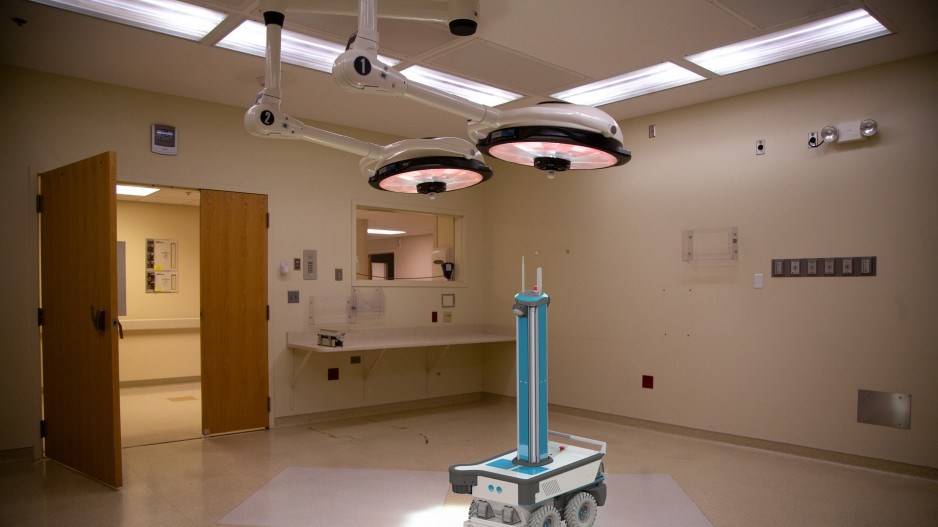In a non-pandemic year, travellers landing at Vancouver International Airport (YVR) or staying at a Lower Mainland hotel might be greeted by a polite “hello” or an unnecessary “sorry.”
But in 2021, it may be robots greeting them upon arrival.
Burnaby-based engineering firm Advanced Intelligent Systems Inc. (AIS) has been given the nod to pilot a line of autonomous robots capable of disinfecting surfaces using ultraviolet light at YVR and at an undisclosed hotel chain.
The Orion robots can map large-scale environments like hospitals, navigate to designated points that require cleaning and then perform hands-free and human-free UV disinfection.
The greenlight from YVR and the hotel chain, which is deploying the robots at locations in Metro Vancouver, comes after AIS and non-profit Next Generation Manufacturing (NGen) split the $1.95-million costs of the project last year.
AIS got its start in 2014 trying to address labour shortage issues at horticultural nurseries through autonomous machinery, but it has since been branching out into agriculture.
The company had already developed the hardware and software necessary for robots to navigate locations and perform tasks, paving the way for a quick launch during the pandemic.
After the NGen grant was delivered in July 2020, AIS completed work on the Orion iteration of its robots within two months.
“We said let’s create modules – robotic modules – and let’s use this module to help other companies lower their development time and development costs of creating new robots,” CEO Afshin Doust told BIV in 2020.
“People started reaching out to us to say, ‘Hey, can we use your robots in order to create UV-disinfecting robots out of them?’ And we said, ‘Yes, we do have the modules.’”
The only thing that needed to be added were the UV lights.
Other B.C. companies have been creating similar autonomous robots.
Vancouver-based A&K Robotics Inc. got its start creating janitorial robots before going on to develop a disinfecting robot four years ago. It eventually abandoned the project after the latter gained little traction in the market.
“The problem was back in 2017, nobody wanted to pay for a robot that would clean what’s invisible to us,” CEO and co-founder Matt Anderson told BIV last year.
“So we shelved it, and it’s basically been collecting dust ever since.”
But the COVID-19 crisis upended that, prompting the company to revive the prototype known as AMRUD with financial backing from NGen.
“We’ve had this shift recently from cleaning for visual appearance to cleaning for public health,” Anderson said.
“Now as a result of that, people understand the importance of disinfecting, especially in health-care environments.”
Equipped with wheels and a robotic arm, AMRUD is essentially a miniature self-driving vehicle that disinfects using low-powered UV lights capable of getting within centimetres of surfaces to clean them.
One array of lights targets floors, while fellow Vancouver tech firm Sanctuary AI has partnered on the project to help develop the arm that uses UV lights to disinfect high-touch surfaces like door knobs.
Both AIS and A&K use the business model centred on “robot as a service” (RaaS) – a take on SaaS (software as a service) – allowing companies to rent the machines instead of investing significant amounts of capital all at once.
“What I see for AIS in the future is we’ll probably be pivoting into creating a lot more robots for different verticals, and we’ll also be using our modules to allow our colleagues in other robotic companies to be able to produce robots faster and at a cheaper price,” Doust said.


